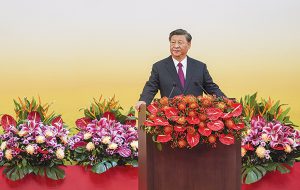The Jumbo Floating Restaurant, a landmark attraction built in the style of an imperial palace that adorned the south side of Hong Kong island for more than four decades, capsized this month in the South China Sea, having been towed away after its business was rendered unprofitable by the pandemic. Social media users were quick to see a metaphor. As Hong Kong prepares to celebrate the 25th anniversary of its return to China, the city’s dreams of autonomy and democracy are as stricken as this jaded colonial-era icon.
That isn’t the official narrative, needless to say. The Hong Kong government has set up a celebratory website for the anniversary, under the heading: “A New Era: Stability, Prosperity, Opportunity.†A theme song titled “Heading Forward†features numerous Cantopop stars intercut with scenes of the city’s landscape and activities – including kindergarten children goosestepping with the Chinese flag. The song doesn’t appear to have captured the popular imagination yet: Three weeks after being released, a YouTube version had 4,200 views and 50 “likes.†By contrast, “Glory to Hong Kong,†an unofficial anthem of Hong Kong’s 2019 pro-democracy protests, has 3.5 million views and 117,000 likes.
Anniversaries are often arbitrary milestones. They nevertheless offer an opportunity to stop and take stock, to assess where we have come from and where we are heading. And Hong Kong’s silver jubilee as a special administrative region of China has a particular significance, being the halfway point of the 50 years during which Beijing promised the free-spirited capitalist city a high degree of autonomy and an unchanged way of life. When looking for clues on the future direction of this global financial center that grew out of a colonial trading post, it makes sense to scrutinize the past. History may not repeat, but it certainly rhymes.
Handover day wasn’t particularly memorable, for me. It was a historic occasion, everyone knew: the end of more than 150 years of British rule, a closing curtain on the UK’s empire and a symbol of the rise of China. Thousands of journalists had flown in from around the world to cover the event. But the big questions had been settled long in advance. Those who intended to get out before Beijing resumed control had already mostly done so. Those who remained were content, or at least resigned, to watch what happened; pride, hope and excitement mingled
with varying degrees of apprehension.
I spent the early part of the evening at a party of German expatriates in the Mid-Levels district of Hong Kong Island that promised a good view of the fireworks in the harbor below. With the hoi polloi kept well away from the invite-only official festivities, we watched on television. There was one moment that seared me with emotion, I’ll admit: when the orchestra at Britain’s harbor-front farewell played Elgar’s Nimrod (I am British, after all). The staid and choreographed handover ceremony itself left me cold. Military pomp, whether colonial or communist, has never held much appeal. Amid much shouting, marching and horn-blowing, some flags were lowered and others raised, and it was over. We went to bed, woke up the next morning and life carried on as normal. The parachute correspondents flew on to their next global assignment.
Looking back, it is striking how we have come full circle; how the sense of foreboding and anxiety that pervaded much of the media coverage of the handover (which arrived just eight years after Tiananmen) has come to be vindicated, so completely and yet so belatedly. A central question, then, is: Why did it take so long? If the Communist Party intended to renege on its promises, then why did it not act sooner?
Tibet offers one possible answer. Scholars have drawn parallels between the “One Country, Two Systems†formula that governed Hong Kong’s return to Chinese sovereignty and the Seventeen Point Agreement that incorporated Tibet into the People’s Republic in 1951. The agreement pledged the region autonomy and to preserve its way of life, but tensions with Beijing led to an uprising in 1959 that was suppressed by the People’s Liberation Army, after which the central government set about assimilating Tibet into the nation’s socialist system. (China blames a reactionary clique set on preserving feudal practices for inciting the rebellion and calls its takeover a “democratic reform†and “emancipation.â€)
It’s a strategy that borrows from the approach of China’s imperial dynasties to its periphery. “The Qing emperor allowed local elites in newly incorporated regions with distinct customs and leadership to exercise local autonomy. But not indefinitely,†as Ho-fung Hung, a professor at Johns Hopkins University, has written. “Over time, they would be integrated into the core territory of the empire, being culturally assimilated and having their local autonomy abolished.â€
The head of the Communist Party’s Southwestern Bureau in 1949-52, and in charge of negotiations with the Dalai Lama government, was Deng Xiaoping. Three decades later, as China’s paramount leader, Deng oversaw the negotiations with Britain on Hong Kong’s future and is credited with proposing the One Country, Two Systems arrangement. (Deng frequently spoke of his desire to set foot in the territory after its return to China. He missed the handover by four months, dying at 92 in February 1997. Memories of that day are as vivid as July 1. Although the city was still at that point under British rule, Hong Kong’s subway operator spent the day piping funeral music through its loudspeaker system. The eeriness of hearing that lugubrious sound echoing through station tunnels has stayed with me since.)
Seen through this lens, then, Hong Kong’s autonomy was always a strictly transitional affair, with absorption into the national system the ultimate destination, whether voluntary or otherwise. Indeed, 50 years put a finite time frame on the city’s separate status from the start. In the event, it lasted 23 years, until Beijing imposed a national security law that radically reshaped Hong Kong society. Perhaps, for a country famous for taking the long view, the missing 27 years is a mere rounding error.
—Bloomberg
Matthew Brooker is a Bloomberg Opinion columnist covering finance and politics in Asia. A former editor and bureau chief for Bloomberg News and deputy business editor for the South China Morning Post, he is a CFA charterholder
 The Gulf Time Newspaper One of the finest business newspapers in the UAE brought to you by our professional writers and editors.
The Gulf Time Newspaper One of the finest business newspapers in the UAE brought to you by our professional writers and editors.

